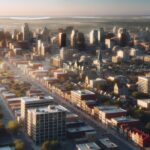Table of Contents
Understanding the Orania Movement
The Orania Movement, a small yet rapidly growing settlement in South Africa, is making headlines as it seeks to establish itself as a fully autonomous region. With a population of around 3,000 Afrikaners, this community is located in the Karoo region and has been advocating for recognition and support from the United States.
The movement has gained traction, especially after former President Donald Trump highlighted the plight of Afrikaners facing challenges in South Africa.
Founded in 1988, Orania has developed its own infrastructure, including water purification and solar power systems, and has seen a significant increase in its population and business projects.
The community prides itself on its cultural heritage and aims to create a safe haven for Afrikaners, emphasizing their connection to the land and their desire for self-governance.
The push for U.S. support
Recent developments indicate that the Orania Movement is not just seeking refuge but is actively pursuing autonomy within South Africa.
Leaders of the movement have traveled to Washington, D.C., to engage with U.S. officials and garner support for their cause. Joost Strydom, the CEO of Orania, has articulated the community’s desire for recognition as a distinct group within South Africa, rather than as refugees.
This approach aims to secure a future where Afrikaners can thrive independently.
As discussions unfold, the U.S. State Department has acknowledged inquiries from individuals interested in refugee resettlement, signaling a potential shift in how the U.S. engages with South African communities.
The Orania Movement’s efforts are part of a broader narrative surrounding Afrikaners and their rights, particularly in light of recent land reform policies in South Africa that have raised concerns among white farmers.
The cultural significance of Orania
Orania is more than just a settlement; it represents a cultural revival for Afrikaners.
The community has established Afrikaans language schools and is planning to open its own university, emphasizing the importance of education and cultural preservation. Residents like Hanli Pieters express pride in their identity and the sense of security that Orania provides. For many, it is a place where they can live authentically, practice their beliefs, and contribute to a shared future.
The movement’s slogan, “Help us Here,” encapsulates their plea for assistance in achieving autonomy. As they navigate the complexities of international relations and domestic policies, the Orania Movement stands at a crossroads, seeking to balance their cultural aspirations with the realities of a changing political landscape.



